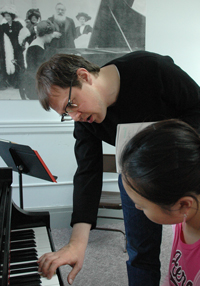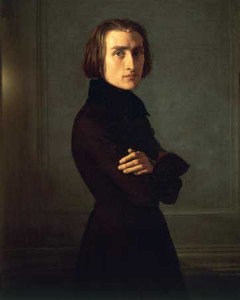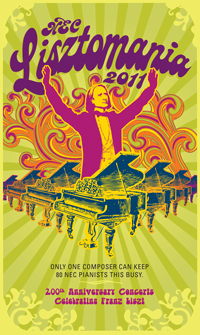Classical Music Interview: Franz Liszt’s 200th Birthday Bash
It’s the 200th birthday of Franz Liszt, and there are concerts, conferences, and projects devoted to the pianist/composer going on all over the world this year. Lisztomania at New England Conservatory is one of a number of parties in the Boston area. The Boston Conservatory is also puttin’ on the Liszt.
By Bill Marx
In 1892 music critic George Bernard Shaw wrote about a “frail,” young, female pianist tackling a fiery Franz Liszt ballade, noting that she confronted passages that “from Liszt’s point of view might be arranged as a duet for a lion and a hurricane, [but] it is almost as if a baby mermaid had got into the whirlpool, or had petulantly insisted on trying to shoot the rapids below Niagara.” Chances are good that the young musicians taking on Liszt’s music at the two local celebrations of his 200th birthday—at The Boston Conservatory and the New England Conservatory (NEC)—will not be so faint-hearted.
From March 2 to 12, The Boston Conservatory presents a series of concerts dedicated to Liszt, most of them featuring students, faculty, and visiting artists. On March 8, Canadian pianist André Laplante performs as part of the Liszt Festival—aside from Laplante, all the performances are free.
Now through July, New England Conservatory is presenting Lisztomania, which calls on 80 of its piano majors to do homage to the music of the charismatic pianist and composer, who no doubt would have loved the fuss. The performances are under the direction of NEC piano chair Bruce Brubaker; every concert, forum, and master class is free.
I spoke to Brubaker about the enduring power of Liszt and the reasons behind tossing such an elaborate party.
ArtsFuse: This year marks the 200th anniversary of Franz Liszt’s birth. Besides this milestone, what other reasons were there for honoring the composer with a festival of his music at New England Conservatory?
Bruce Brubaker: The possibility of hearing every piano student in the conservatory play in one large performance project was very appealing. It has not happened at NEC in recent times.
ArtsFuse: British director Ken Russell made a film about Liszt called Lisztomania. Is the festival suggesting some sort of connection with the 1975 movie, which starred Roger Daltrey?
BB: Along with being the title of the 2009 hit song by the band Phoenix and the title of Ken Russell’s 1975 film, Lisztomania is the term devised in 1844 by the poet Heinrich Heine to describe the frenzied public reactions to Liszt and Liszt’s performances.
ArtsFuse: How were the Liszt compositions chosen for each performance?
BB: Many people are involved, the NEC piano faculty and our students. From the beginning we wanted to avoid duplicating pieces and to explore some music that’s not heard often. There’s so much music by Liszt! Even with our seven rather lengthy programs, I believe we’re only doing about six percent of Liszt’s piano music. Within the series, some programs are very focused, one evening with the complete “Switzerland” and complete “Italy” from the Years of Pilgrimage; others are more general. There’s a concert focusing on etudes, and one program centering on pieces relating to J. S. Bach.
ArtsFuse: Are you planning to present annual festivals devoted to the music of individual composers?
BB: As our musical life and understanding moves away from the model of “composer” as creator, we are going to hear and understand the past in many ways. At New England Conservatory, we did do large-scale piano projects involving Messiaen’s music in 2008 (including the first Boston performance of the Catalog of the Birds), the complete piano “sonatas” by Haydn in 2009, and, in 2010, two recreations of Paris concerts given by Chopin. Our piano students also presented a series featuring Haydn’s music at the Los Angeles County Museum of Art, with the museum’s support. Other NEC piano projects have not been composer specific. In 2007 we did a festival about futurism seen in two centuries of keyboard music and collaborated with the Boston Symphony to present chromatic piano music by Beethoven and Schoenberg in 2006 when Mr. Levine gave his exceptional series with the BSO.
ArtsFuse: What do you believe to be the strengths of Liszt the pianist and Liszt the composer? And how does his music challenge performers?
BB: Liszt was the modern virtuoso. Concert pianists, even those who never play a note of Liszt’s music, are his descendants. Liszt’s poetic imagination for the piano—its sounds and modes of communicating—is so varied and nuanced. The scores are filled with wondrous things. I think the music calls for performerly performance! The way ideas unfold in the moment, the physical hearing of the sound in the room, the attention of the listeners—it’s very much this music. I’m craving the unrepeatable playing of a living concert, the mind and fingers of the improviser, even if it’s scripted music.
ArtsFuse: Are the participants in Lisztomania all students, faculty, or alumni of NEC? How were the individual performers chosen?
BB: In Lisztomania at NEC, all the performers are current students in the school. No faculty or alumni or outside artists are playing. Our aim was that every current college pianist and some students from the Preparatory school would perform. So there were no auditions or competitions, besides an annual piano concerto competition to select a soloist for what we specified would be a concerto by Liszt. Huijuan Pan will perform the E-flat Concerto by Liszt on April 11, with the NEC Philharmonia conducted by David Lockington.
ArtsFuse: Liszt wrote many arrangements. In the program featuring transcriptions, arrangements, and paraphrases, how did you decide which to present?
BB: In the February 11 Jordan Hall program, I wanted to suggest the breadth of Liszt’s range of transcribing, to allow some less often heard pieces to be included, and to include especially good performances of works already in some of our pianists’ fingers. Making this program was a cooperative effort. We managed to include Liszt’s version of part of Beethoven’s Fifth Symphony, and part of the Fantastic Symphony, and a lot of other music that represents Liszt’s role as musical spokesman in the period before professional symphony orchestras, before Schubert’s music was well known, before much of what we take for granted was established. There will be several transcriptions in later Lisztomania concerts, notably Liszt’s entire solo piano version of Winterreise by Schubert on March 18.
ArtsFuse: Will the festival feature any of Liszt’s songs or chamber music?
BB: We considered a song concert. When pianist Alfred Brendel was with us at NEC, he even suggested we include a performance of Leo Weiner’s large orchestral version of Liszt’s Sonata in B Minor! Eventually, we settled on presenting the biggest possible number of performances of solo piano music by our students.
ArtsFuse: Russell Sherman is conducting a master class during the festival. Did you consider holding additional master classes?
BB: As New England’s Distinguished Artist-in-Residence, Mr. Sherman gives at least one public master class each year. We treasure them. This season it seemed completely right to make his master class an official part of Lisztomania. We offer a number of master classes each year given by current faculty, as well as visiting soloists with the Boston Symphony.
ArtsFuse: What do you hope will stay with audience members about Liszt and his music once Lisztomania has ended?
BB: A thrilling experience of artistic, musical, and poetic expression as conveyed using the high-technology, musical tool of the Industrial Revolution—the modern piano.
ArtsFuse: Do you have any other single-composer concert events in mind? What about next year?
BB: As much as I’m resisting the idea of celebrating every centennial, it’s irresistible to do something involving John Cage’s music in 2012.
ArtsFuse: How is the NEC’s celebration of Liszt different from programs dedicated to the composer/performer being held by other Boston schools and organizations?
BB: There are wonderful concerts, conferences, and projects devoted to Liszt going on all over the world in 2011. Lisztomania at NEC is a showcase for our students. It’s over 10 hours of opportunity to hear young, world-class virtuosos who come from around the globe.
Bill Marx is the editor-in-chief of the Arts Fuse. For over three decades, he has written about arts and culture for print, broadcast, and online. He has regularly reviewed theater for National Public Radio Station WBUR and the Boston Globe. He created and edited WBUR Online Arts, a cultural webzine that in 2004 won an Online Journalism Award for Specialty Journalism. In 2007 he created the Arts Fuse, an online magazine dedicated to covering arts and culture in Boston and throughout New England.
Tagged: Boston-Conservatory, Bruce Brubaker, Franz Liszt, New England Conservatory, birthday




The Lisztomania concert at Jordan Hall On February 11 was great. It was overwhelming to hear so many amazing New England Conservatory students. Fire-breathing virtuosos. Move over Mr. Kissin and Miss Argerich…